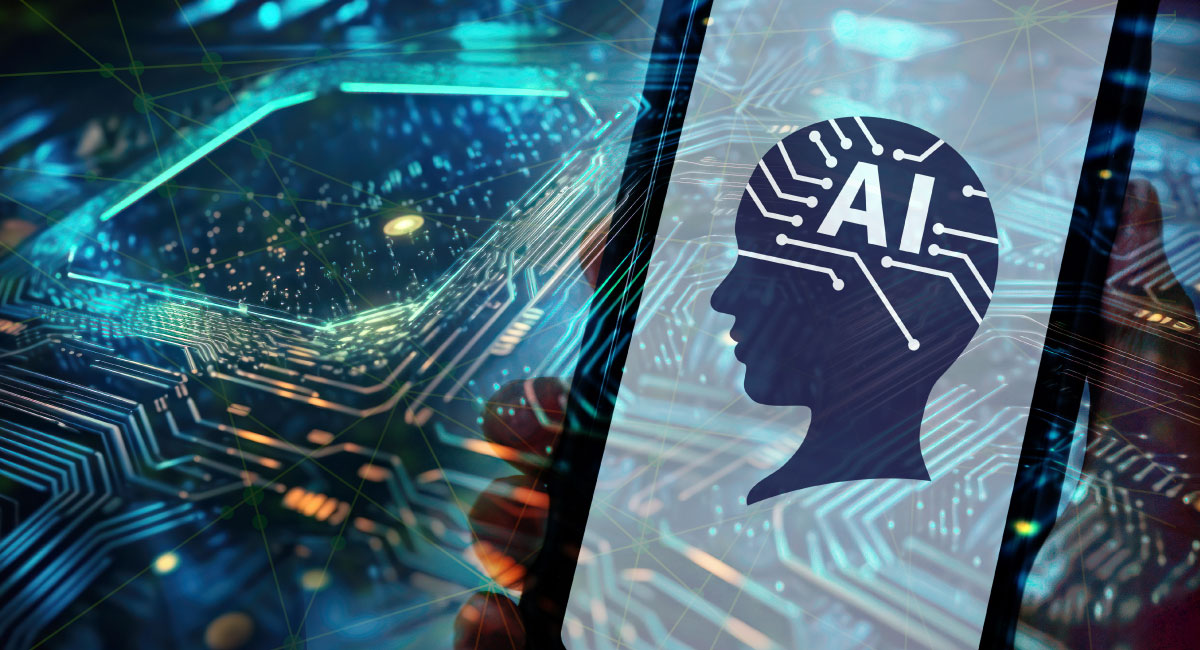Artificial intelligence has been responsible for much talk over the last few months (including some controversies), which is hardly surprising. AI is a cutting-edge technology growing in sophistication and popularity, presenting new possibilities and opportunities.
This article focuses on the vital skills associated with artificial intelligence, primarily to inform potential candidates who want to pursue a career. We will cover the skills you need, both technical and non-technical, for a successful career as an artificial intelligence engineer, as well as look at salaries and how to boost your Artificial Intelligence skills.
But before we discuss the skills required for artificial intelligence, let’s define the term.
What is Artificial Intelligence?
Artificial intelligence, or AI, is a branch of computer science that duplicates human cognitive abilities, allowing machines and apps to perform complex tasks previously only done by people. These tasks include decision-making, data analysis, and translating languages. AI code is specially designed to do work that requires human reasoning. Before the advent of AI, automated systems were programmed to perform their duties by following the same instructions repeatedly, accomplishing the tasks without variation or change. But with artificial intelligence, machines employ algorithms to learn from their interactions. And the more they learn, the better they get at their job.
These days, artificial intelligence is used for virtual assistants (e.g., Alexa, Siri), speech recognition, expert systems, natural language processing, self-driving cars, social media monitoring, healthcare management, manufacturing robots, and machine vision.
Top Skills Required for Artificial Intelligence
Finally, here are the skills that every competent artificial intelligence professional should possess to one degree or another.
Technical Artificial Intelligence Skills
Here are the “hard” skills AI professionals need.
- Programming Languages. Even though low-code artificial intelligence software is becoming more popular, most organizations with dedicated AI teams often need custom-made systems to meet their goals. This expectation requires proficiency in one or more of the following programming languages.
- Python. Python is considered one of the world’s most well-known and widely used languages and is especially popular in AI and data science. AI professionals use Python for data mining, deep learning, neural networks, and visualization.
- Java. Java is typically used for AI-related tasks such as procedural, genetic, and intelligence programming, all of which help guide artificial intelligence systems. Java is also used for search algorithms and multi-robot systems.
- C++. C++ is a low-level language used by AI professionals to develop advanced elements such as artificial neuron models and neural net functions. AI program cores are often written in C++ because it offers high performance and speed.
- Julia. Julia is popular in machine learning because it’s a highly performant language that offers many machine learning packages. Julia is also used for data analytics and data visualization.
- R. R is often used in machine learning and is a popular choice for AI-related tasks involving neural networks, numerical analysis, and statistical computations. However, R was primarily designed for data science.
- Scala. Scala is effective for dealing with large data sets and complex algorithms, making it an ideal choice for machine learning. Scala’s popularity is growing, with more machine learning and AI-related libraries becoming available.
- Big Data Analytics. Machine learning uses enormous amounts of data to make complex predictions, such as the volume levels found in big data.
- Cloud Computing. Most major industries are moving from in-house servers to cloud platform solutions. Additionally, many of today’s applications are developed as a set of independent microservices that are deployed and run on the cloud. Cloud computing lets organizations scale their IT framework to match demands, saving operation costs and capital investments.
- Deep Learning and Neural Networks. Although not every AI-related role requires working with neural networks, it’s essential to understand the processes behind them and why they’re important.
- Data Engineering. You need to learn data engineering if you prefer working with AI instead of developing it. Although AI has many uses, most organizations use it to improve their analytics and data science. By using machine learning algorithms, businesses can generate predictions regarding their competition, their market, and almost any new venture they want to launch.
- Data Visualization. Artificial intelligence and machine learning typically answer questions using massive data sets. These answers must be visualized to communicate the findings to non-technical stakeholders. AI professionals need data visualization skills to create graphs and charts and graphs that present their findings in an easily digestible manner.
- Machine Learning Algorithms. Machine learning algorithms gather data and change it into a model. These algorithms are used to solve classification and regression problems and are essential for anyone who wants a career in artificial intelligence.
- Mathematics and Related Disciplines. Deep learning algorithms and neural networks are built according to mathematical concepts such as calculus, linear algebra, probability, and statistics. AI engineers need a solid grasp of mathematical skills.
Non-technical Artificial Intelligence Skills
Non-technical or “soft” skills have a place in the AI professional’s skill set. These skills are not learned in the classroom but instead cultivated through experience and practice.
- Critical thinking. Critical thinkers excel at spotting mistakes and inefficiencies, analyzing and questioning the information instead of merely accepting it at face value.
- Creative and curious mindset. A good AI professional applies a healthy curiosity and creative thinking to solve AI-related problems. This skill includes the ability to think outside the box.
- Detail-oriented. AI programs are complex creations, so the industry needs detail-oriented professionals to optimize them. A part of an application might work fine, but by reviewing the small details, the AI professional could find ways to improve it.
- The ability to function under pressure. Many AI professionals and data scientists work against high-pressure deadlines and high expectations. These demands require the AI professional to work well under pressure and keep their wits.
- Teamwork. AI professionals rarely work alone, so they need to be able to “play well with others.” This soft skill also covers communication and cooperation.
What Tools Should You Be Familiar with for an AI Career?
If you want an AI career, there are specific tools you should get acquainted with. They are:
- Keras. Keras functions as an interface for TensorFlow libraries and works as an API, allowing AI professionals to use Python to interact with artificial neural networks.
- PyTorch. PyTorch is an open-source machine learning framework and deep learning library that can be used with a Python or C++ frontend. It features cloud support and has natural language processing.
- Tableau. This tool is a low-code analytics and visualization platform offered by Salesforce. Tableau is designed for various roles, such as analysts, executives, IT professionals, and business users.
- TensorFlow. This resource is a Python library that helps AI professionals quickly and easily create production-grade deep learning models.
What Are the AI Jobs You Can Choose From?
If you want a career in artificial intelligence, you must specify what job you’re interested in. Fortunately, the field of artificial intelligence has many different career paths. Listed below are some of the most common AI-related careers.
- Artificial Intelligence Engineer
- Big Data Engineer
- Business Intelligence Developer
- Data Analyst
- Data Scientist
- Machine Learning Engineer
- NLP (Natural Language Processing) Engineer
- Research Scientist
- Robotics Engineer
- Software Architect
- Software Engineer
What Do AI Engineers Salaries Look Like?
We could devote an entire article to salary information for every possible artificial intelligence career path. Instead, we will check out the salary situation for AI engineers. This data will give you a good idea of how well-paying a career in AI can be.
According to the Glassdoor.com job website, basic artificial intelligence engineers in the United States earn a yearly average salary of $161,002. This figure breaks down to $120,377 in regular pay and approximately $40,625 in bonuses, profit sharing, and other perks. A Lead Machine Learning Engineer makes $167,553 per year, and a Senior Machine Learning Engineer earns $179,235 per year, total pay.
Of course, these salary figures can vary depending on company size, geographical location, demand, and the candidate’s skill set.
How to Increase Your Artificial Intelligence Skills
Whether you’re a beginner or a seasoned professional who wants to upskill, there are many ways to boost your artificial intelligence skill set.
Use Online Resources
Online content is one of the most convenient ways to introduce study into your schedule. These resources include:
- Blogs. Check out popular AI-related industry blogs like Towards Data Science and Machine Learning Mastery. Blogs are excellent sources of news and information.
- Online Courses. Countless online courses are available, from mini-courses that run for a few hours to full-on 6-month curricula.
- Podcasts. Podcasts are a convenient means of getting informed. Shows like The AI Podcast offer engaging conversations relating to artificial intelligence.
Sign Up for a Bootcamp
AI bootcamps offer flexible, practical education in artificial intelligence and machine learning fields. Although bootcamps can be an intense, information-heavy experience, they’re ideal for the motivated beginner who wants to learn the skills needed for a fulfilling AI career.
Volunteer Your Services
This option isn’t for everyone since most people need to have money coming in regularly. But if you have the time and bandwidth, try contributing to open-source projects. You can help a start-up business by working as an intern, although this carries risks, as not all start-ups succeed. Still, experience is experience, and it all looks great on a resume.
Go “All-in” in the AI Community
Get involved in an AI-related community. You can make contacts and friendships, learn from others, and increase your visibility. Examples of involvement include:
- Joining an online community
- Follow AI experts on social media platforms
- Network on LinkedIn.
Get a Mentor
Experience is a great teacher; someone else’s vast experience and knowledge could help you expand your horizons. Having a mentor doesn’t have to be an official, structured relationship. Find possible mentors at work, school, or in one of the aforementioned online communities.
Keep Current with the Latest Trends
The field of artificial intelligence is changing every day, growing by leaps and bounds. So, keeping up with the latest innovations is crucial if you want to stand out in your artificial intelligence career. Following trends also helps you discover new fields, venues, and niches that may catch your interest so you can foster your domain knowledge and become an even more valuable team member.
Do You Want Expertise in Artificial Intelligence and Machine Learning?
Artificial intelligence is a complex, demanding field requiring a formidable skill set. That’s why taking advantage of online learning resources such as this AI ML course. This six-month, intense bootcamp teaches you skills such as deep learning, ML, NLP, computer vision, generative AI, reinforcement learning, prompt engineering, ChatGPT, and more.
According to Glassdoor.com, AI engineers in the United States may earn a yearly average of $161,002. The demand is high, and so are the challenges. So, if you want an exciting career with staying power, get your Artificial Intelligence skills in order with this highly effective online bootcamp and be ready to face the challenges of artificial intelligence.
FAQs
Here are some of the most common questions asked when discussing a career in artificial intelligence. Note that some responses draw from the same information we’ve already covered.
Q: Do I need coding skills if I want to work in the artificial intelligence field?
A: Most AI positions require some degree of coding.
Q: How do you develop AI skills?
A: Your options for AI skill development include getting a degree (bachelor’s, master’s, or associate’s), taking online courses and bootcamps, creating your own portfolio, volunteering for projects, or getting an internship.
Q: Can I get a career in artificial intelligence without a degree?
A: Although many employers still like to see a degree on your resume or CV, if you have a good portfolio you created once you have taken online courses, online AI bootcamps, self-study, or certifications, you might manage without a degree.
Q: What do you recommend for the first programming language I should learn if I’m going into the AI field?
A: If you’re new to AI and programming, start with Python; it’s one of the most popular programming languages in the world and is very beginner-friendly. If you already have coding experience, lead off with C++.






